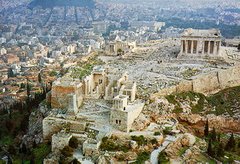
In thinking about Antigone, Shakespeare's Romeo and Juliet comes to mind in the way that it deals with similar themes, and some of the events resemble those from Antigone. In both plays a girlfriend/wife commits suicide and then the grieving lover commits suicide as well. In Sophocles' play, Antigone is shut inside a cave and takes her own life. When Haemon, her lover, discovers that she has died, he is so taken with grief that he commits suicide. In Shakespeare, Juliet finds that Romeo has died and commits suicide as well. The role of Antigone can be found in both Romeo and Juliet in the love they share that is forbidden by authority--each of their parents. Creon is represented by the unrelenting force that is held by both the Capulets and the Montagues in their war against each other. This war is unreasonable, but will not stop until it is too late, as Creon's decision to free Antigone comes too late. In both plays it is the old pitted against the young. The young have the freedom to see through these rules and conflicts and they choose what they feel is right, despite the impending consequences. In both plays, it is only after tragedy that the authority figures realize the mistake that they have made. Creon loses his son and his wife, and the Capulets and Montagues lose many lives on both sides.



